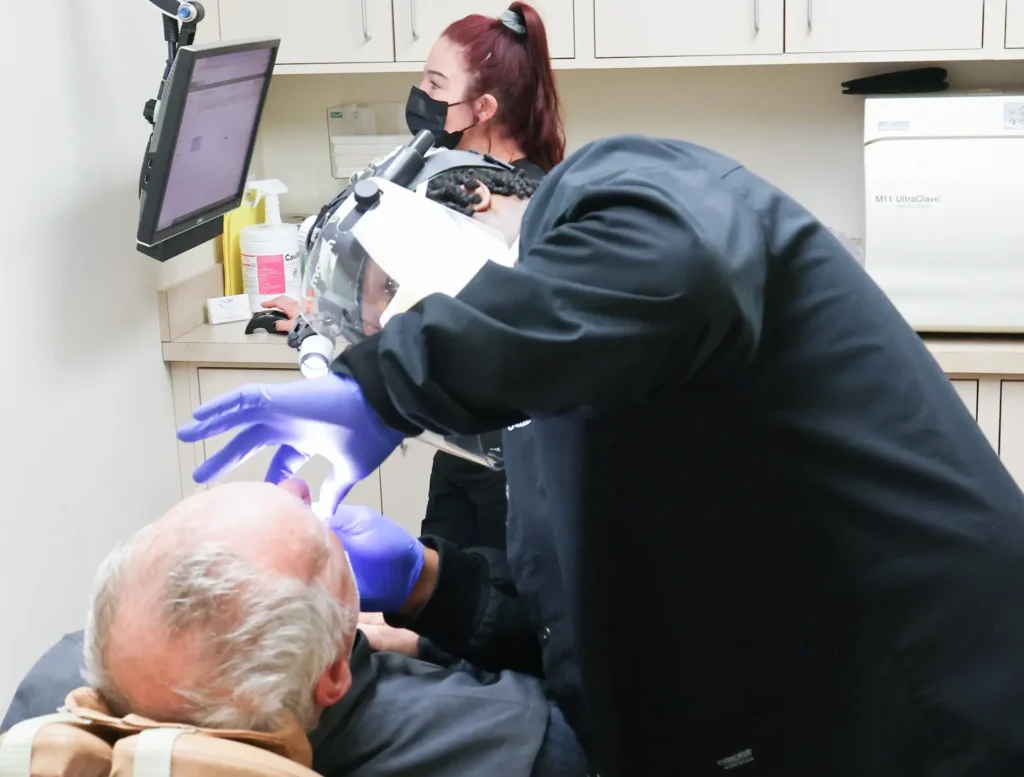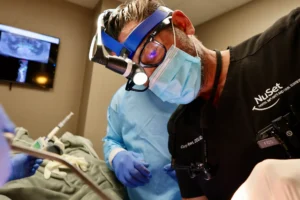Losing a tooth can feel overwhelming. You might avoid smiling or struggle with eating your favorite foods. If that sounds familiar, you’re not alone—millions of people face the same challenge. In fact, about 178 million Americans are missing at least one tooth.
The good news is that dental implants offer a reliable way to replace missing teeth. They look natural and help you feel more like yourself again. But with different types of implants available, it’s important to find the right fit for you.
This is why we’re here to help you understand the types of dental implants out there so you can feel confident when talking to your dentist.
3 Types of Dental Implants
There are three main types of dental implants: endosteal, subperiosteal, and zygomatic. Each type is used in different situations based on your needs and bone structure.
Endosteal Implants
Endosteal implants are the most common type. These implants are placed directly into your jawbone. They are shaped like small screws and made of materials like titanium or zirconia. Over time, they fuse with your bone, providing a stable base for one or more replacement teeth.
Endosteal implants are usually recommended if you have a healthy jawbone that can support the implant. They offer a reliable, long-lasting solution for missing teeth.
Subperiosteal Implants
Subperiosteal implants are placed under the gum but above the jawbone. They are often used when there isn’t enough healthy bone for traditional implants, and bone grafting isn’t an option.
The implant sits on top of your bone, held in place by your gum tissue. This type of implant may be a good choice if you have less bone density or prefer a less invasive procedure.
Zygomatic Implants
Zygomatic implants are less common and more complex. They are used when there is severe bone loss in the upper jaw. Instead of being placed in the jawbone, these implants are anchored in your cheekbone, which is called the zygoma.
Zygomatic implants are typically recommended if you aren’t a candidate for bone grafting or other traditional methods. They provide a strong and stable foundation, even with significant bone loss.
Each type of implant has its benefits. The right one for you will depend on your oral health and the condition of your jawbone.
Specialized Implant Techniques

In addition to the main types of implants, there are specialized techniques that make dental implants more accessible for different needs. These techniques are designed to address specific challenges, like limited bone or the need for faster results.
Mini Dental Implants (MDIs)
Mini dental implants are smaller than regular implants. They are often used to stabilize dentures or in cases where there isn’t enough bone for full-sized implants. MDIs are less invasive, which can lead to a quicker recovery time.
These implants are a good option if you have less jawbone but still want the benefits of dental implants. They can help keep dentures in place and make chewing more comfortable.
All-on-4 Implant Technique
The All-on-4 technique uses four implants to support a full arch of replacement teeth. These implants can be either endosteal or zygomatic, depending on your bone structure. The All-on-4 method lets you get a complete set of teeth with fewer implants, making it more affordable and less invasive than placing an implant for each missing tooth.
This technique is ideal if you have lost many teeth or have significant bone loss but still want a fixed, long-lasting solution.
Immediate Load Implants (Teeth in a Day)
Immediate load implants, also called “teeth in a day,” let you get a temporary crown on the same day your implant is placed. Unlike traditional implants, where you have to wait for the post to fuse with your bone, immediate-load implants give you quicker results.
Each technique offers a different approach to getting dental implants based on your individual needs. We will help you figure out which option is right for you so you can enjoy a healthy smile as quickly and comfortably as possible.
Factors to Consider When Choosing the Right Type of Implant
Your oral health, the condition of your jawbone, and the number of teeth you need to replace all play a role. Understanding how these factors affect your options is important so you can make the best decision for your long-term dental health.
Bone Density
If your jawbone is strong and healthy, you might be a good candidate for endosteal implants. These are placed directly into the bone and offer a sturdy base for replacement teeth. If you have lower bone density, subperiosteal implants or mini implants might be better options since they don’t require as much bone.
In cases of severe bone loss, zygomatic implants are an option. They anchor into your cheekbone, offering support even when the jawbone can’t.
Overall Health
Your overall health also matters when deciding which implant to choose. Conditions like diabetes or heart disease can affect healing after surgery. If you have certain health issues, your dentist may recommend implants that involve less invasive procedures or faster recovery times.
Number of Missing Teeth
The number of teeth you’re missing also influences which type of implant is best for you. If you are missing multiple teeth, options like the All-on-4, All-on-5, All-on-6 and All-on-8 techniques can help you restore a full set of teeth using fewer implants. For a single missing tooth, an endosteal implant might be the simplest choice.
When you come to NuSet Dental Implants and Oral Surgery, we will help you find the right option. We will review your medical history, take detailed images of your jaw, and guide you to the best solution for your needs. Our goal is to make sure you choose an implant that gives you comfort and lasting success. We’ll be with you every step of the way to ensure you feel confident in your choice.
Let Us Help You Find the Right Implant for You!
Choosing the right dental implant is an important decision. It can affect your comfort, confidence, and long-term dental health. Whether you need a single tooth replaced or a full arch, there’s an implant option that will work for you.
At NuSet Dental Implants and Oral Surgery, we are here to guide you through the process. We’ll make sure you understand all your options and help you pick the one that fits your needs. Our goal is to give you a solution that lasts, feels comfortable, and restores your smile.
If you’re ready to explore your dental implant options, book a consultation with us now to get started!
FAQs
Which type of dental implants are best?
The best type of dental implant depends on your individual needs. Endosteal implants are often used when there is enough healthy jawbone. Subperiosteal implants work well for those with less bone, while zygomatic implants are a good option for severe bone loss. Each type has its strengths, and your dentist will help you decide which option is best for you.
What are the three main types of dental implants?
The three main types of dental implants are endosteal, subperiosteal, and zygomatic. Endosteal implants are the most common, placed directly in the jawbone. Subperiosteal implants sit on top of the bone but under the gum, and zygomatic implants anchor into the cheekbone for more complex cases. Each type serves different needs, and your dental specialist will recommend the best one for you.
What are the healthiest dental implants?
All dental implants are designed to be safe and healthy options for replacing missing teeth. Endosteal implants are commonly used and integrate well with your natural bone. Subperiosteal and zygomatic implants are also effective for people with unique needs. No matter the type, your dentist will choose the healthiest option for your dental and overall health.
What type of implant is most commonly used in dentistry?
Endosteal implants are the most commonly used type in dentistry. They are placed directly into the jawbone and provide a strong, stable foundation for replacement teeth. However, your dentist may recommend a different type, like subperiosteal or zygomatic implants, based on your specific needs.





